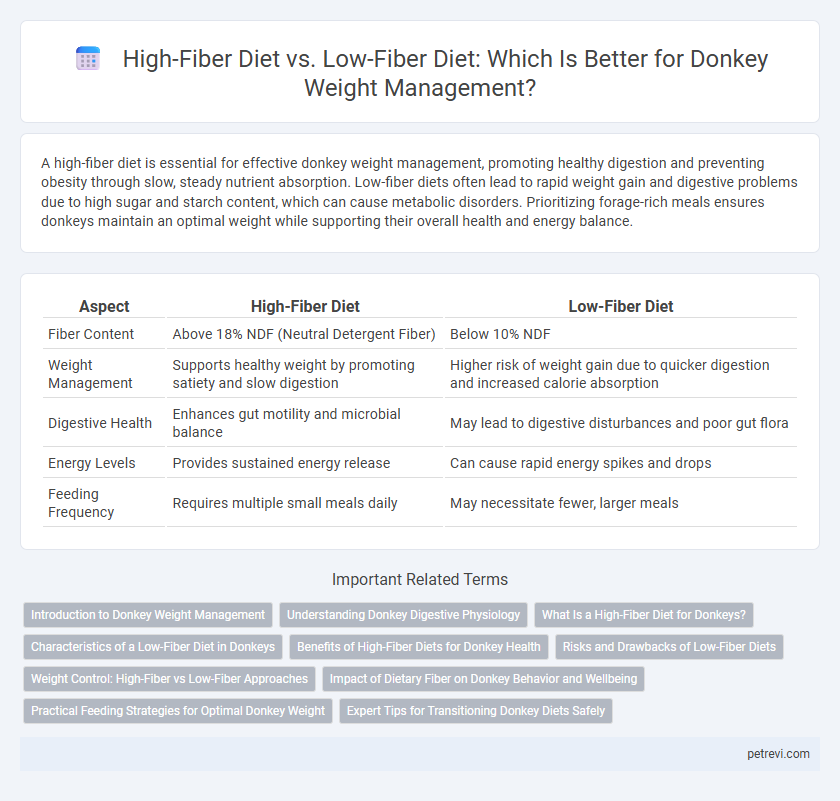A high-fiber diet is essential for effective donkey weight management, promoting healthy digestion and preventing obesity through slow, steady nutrient absorption. Low-fiber diets often lead to rapid weight gain and digestive problems due to high sugar and starch content, which can cause metabolic disorders. Prioritizing forage-rich meals ensures donkeys maintain an optimal weight while supporting their overall health and energy balance.
Table of Comparison
| Aspect | High-Fiber Diet | Low-Fiber Diet |
|---|---|---|
| Fiber Content | Above 18% NDF (Neutral Detergent Fiber) | Below 10% NDF |
| Weight Management | Supports healthy weight by promoting satiety and slow digestion | Higher risk of weight gain due to quicker digestion and increased calorie absorption |
| Digestive Health | Enhances gut motility and microbial balance | May lead to digestive disturbances and poor gut flora |
| Energy Levels | Provides sustained energy release | Can cause rapid energy spikes and drops |
| Feeding Frequency | Requires multiple small meals daily | May necessitate fewer, larger meals |
Introduction to Donkey Weight Management
Donkey weight management centers on maintaining optimal body condition to prevent obesity-related health issues such as laminitis and metabolic syndrome. A high-fiber diet, rich in forage like hay and grass, promotes healthy digestion and slow energy release, supporting steady weight control. Low-fiber diets often lead to rapid weight gain and digestive disturbances due to increased non-structural carbohydrates and reduced gut motility.
Understanding Donkey Digestive Physiology
Donkeys have a unique digestive physiology adapted to efficiently process high-fiber, low-energy diets, making high-fiber intake essential for maintaining optimal weight and preventing obesity-related issues. High-fiber diets support proper hindgut fermentation, promoting gut health and stable blood sugar levels, while low-fiber diets can lead to digestive disturbances and weight gain. Understanding the donkey's natural foraging and fiber requirements is crucial for effective weight management and overall well-being.
What Is a High-Fiber Diet for Donkeys?
A high-fiber diet for donkeys consists mainly of fibrous forages such as straw, hay, and grass, which are low in calories but rich in indigestible fiber, promoting healthy digestion and weight control. This diet mimics the natural browsing behavior of donkeys, helping to prevent obesity and related metabolic diseases by maintaining stable blood sugar levels. Compared to low-fiber diets, high-fiber feeding supports gut motility and reduces the risk of colic and laminitis by ensuring a balanced microbial environment in the hindgut.
Characteristics of a Low-Fiber Diet in Donkeys
A low-fiber diet for donkeys typically consists of high amounts of grains and concentrates with minimal roughage, resulting in reduced chewing and saliva production. This diet can lead to rapid fermentation in the hindgut, increasing the risk of colic, laminitis, and digestive disturbances. Low-fiber feeding often causes weight gain due to higher calorie density and insufficient fiber to promote satiety and proper gut motility.
Benefits of High-Fiber Diets for Donkey Health
High-fiber diets promote optimal digestive health in donkeys by enhancing gut motility and preventing colic and obesity. Rich in cellulose and hemicellulose, high-fiber forage supports natural chewing behavior, which aids saliva production and rumen function. Consistent consumption of high-fiber feed improves nutrient absorption and helps maintain stable body weight, reducing the risk of metabolic disorders in donkeys.
Risks and Drawbacks of Low-Fiber Diets
Low-fiber diets in donkeys often lead to digestive issues such as colic and obesity due to insufficient gut motility and nutrient absorption. These diets can disrupt the microbial balance in the donkey's hindgut, increasing the risk of laminitis and other metabolic disorders. Maintaining a high-fiber intake is crucial for optimal weight management and preventing these health complications.
Weight Control: High-Fiber vs Low-Fiber Approaches
A high-fiber diet promotes slow digestion and sustained energy release, essential for effective weight control in donkeys prone to obesity. Low-fiber diets often lead to rapid weight gain and digestive disturbances due to insufficient bulk and altered gut microbiota. Prioritizing high-fiber feeds such as hay and straw supports healthy weight management by enhancing satiety and maintaining optimal gut function.
Impact of Dietary Fiber on Donkey Behavior and Wellbeing
A high-fiber diet is essential for maintaining optimal digestive health and preventing obesity-related issues in donkeys, promoting natural foraging behavior and reducing stress. Low-fiber diets can lead to behavioral problems such as crib-biting and stereotypies due to insufficient chewing and fiber intake, negatively impacting wellbeing. Proper fiber levels ensure stable gut flora, support hydration, and improve overall mental and physical health in donkeys.
Practical Feeding Strategies for Optimal Donkey Weight
A high-fiber diet for donkeys primarily consists of roughage like hay, grass, and straw, which promotes healthy digestion and helps maintain optimal weight by preventing obesity. Low-fiber diets, often rich in grains or concentrates, can lead to rapid weight gain and digestive issues, making them less ideal for weight management in donkeys. Practical feeding strategies include providing unlimited access to low-calorie forage, monitoring pasture intake, and using slow feeders to control portions while ensuring adequate fiber intake for overall health.
Expert Tips for Transitioning Donkey Diets Safely
Transitioning a donkey from a low-fiber diet to a high-fiber diet requires gradual changes over several weeks to prevent digestive disturbances such as colic or laminitis. Experts recommend introducing high-quality forage like mature grass hay in increasing amounts while monitoring body condition scores and stool consistency closely. Maintaining consistent feeding times and avoiding sudden increases in starch or sugars ensures a safe adaptation to high-fiber meals for effective weight management.
High-Fiber Diet vs Low-Fiber Diet for Donkey Weight Management Infographic

 petrevi.com
petrevi.com